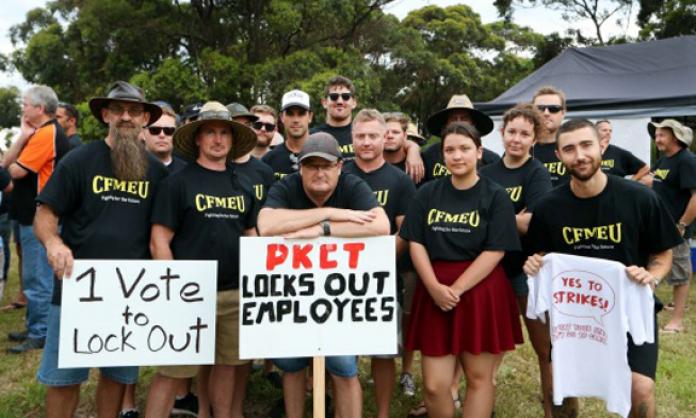The consortium of coal companies that owns and operates the Port Kembla Coal Terminal, near Wollongong, has launched a significant attack on its unionised workforce.
After three years of enterprise bargaining negotiations and a 48-hour strike by the CFMEU over Christmas, the PKCT bosses locked out the workers for four days, organising a scabbing operation and applying to terminate the enterprise agreement – an attempt to strip wages and conditions back to the award.
This is the first time the workforce has been locked out at PKCT. And it’s the first time an employer in the Wollongong/Port Kembla area, a site of historic union strength, has attempted to cancel a collective agreement, something even the Australian Financial Review described as “an unprecedented escalation”.
“What they’re planning to do, basically, is reduce our conditions in the terms of their current position to the National Employee Standards which is basically the lowest level you can go to”, CFMEU delegate Murray Dakers told Red Flag.
“There’s a salary reduction for us by up to 16 percent. They’re targeting our redundancy payments, our measurement of discipline, our flexibility, the way we work, hours of work, everything”, he said.
“In terms of the scope of the agreement and who’s covered by it, they want to remove 20 percent of the employees to move them outside of the agreement.”
Kicking 20 percent of workers off the agreement isn’t just “a divide and conquer tactic” as one worker put it, it’s also a union busting one. PKCT is hoping to remove all the union delegates from the scope of the agreement, alongside many office staff.
Trade unionists across the Illawarra have recognised the significance of the dispute and have visited the assembly in big numbers, with delegations from the local Appin and Tahmoor mines, MUA delegations from Port Kembla and Port Botany and CFMEU members from local construction sites.
As one visiting coal miner put it, “This is a danger to everyone; this is the thin end of the wedge. Our bargaining period is up this year at Appin and if they get away with this here they’ll roll it out across the board”.
The coal companies with a stake in the terminal – South32, Peabody Energy, Glencore, Centennial Coal and Wollongong Coal – have been preparing for a showdown for some time. Workers at the Appin coal mine reported huge stockpiling to prepare for the dispute.
The lockout also highlighted the role the industrial courts play in giving bosses nearly unfettered power, while attempting to hamstring unions with fines and barriers to industrial action. As one terminal operator put it:
“PKCT has a hot-shot legal team who brag about terminating enterprise agreements on their website. We had to jump through hoops and have the Electoral Commission down here to ballot for a strike in Christmas but the bosses can lock us out with no trouble.”
A challenge for the workers as the dispute continues will be dealing with the company-organised scabbing operation. PKCT boss John Gorman bragged about loading 74,000 tonnes of coking coal during the lockout. But there’s no doubt that the workforce has enormous potential power to cripple coal exports. More than $4Billion of coal passes through the terminal annually.
South Coast Labour Council secretary Arthur Rorris highlighted the significance of the attack, telling protesting unionists outside the terminal:
“This is the first time that any of the companies locally have used this tactic of termination of the EA. They don’t go for a four day lockout in Port Kembla unless they’ve got some grand designs … they’re inviting a big retaliatory action.”










